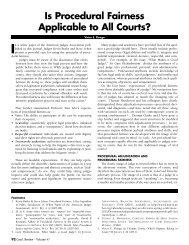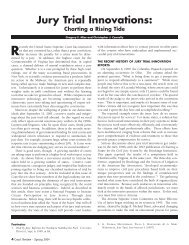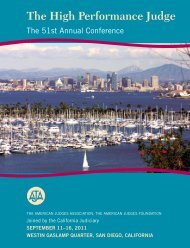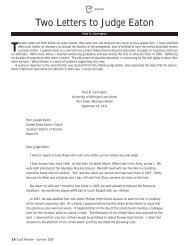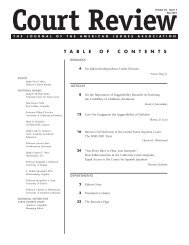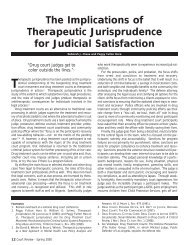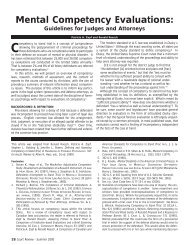Special Issue on Procedural Fairness - American Judges Association
Special Issue on Procedural Fairness - American Judges Association
Special Issue on Procedural Fairness - American Judges Association
- No tags were found...
Create successful ePaper yourself
Turn your PDF publications into a flip-book with our unique Google optimized e-Paper software.
prior experience with the legal system is associated with moreknowledgeable youth, but there appears to be more support forthe c<strong>on</strong>clusi<strong>on</strong> that prior experience does not relate to betterunderstanding of the system. 34Given the poor knowledge performance of many youth inthe juvenile justice system, researchers have explored whethereducati<strong>on</strong>al interventi<strong>on</strong>s can improve youth’s knowledge andunderstanding. Teaching of legal informati<strong>on</strong> improved legalunderstanding, especially for older adolescents (over age 13),ethnic minorities, and youth with higher IQs. 35 However,efforts at increasing youth’s understanding and competencieshave not proved to be very successful with younger childrenand children or youth with developmental or other cognitivedeficits. 36Unlike children facing delinquency charges, children participatingin foster care hearings are not legally required tomeet competency standards. N<strong>on</strong>etheless, it does seem thatgreater understanding of the process might allow children tobetter place their participati<strong>on</strong> in c<strong>on</strong>text and draw c<strong>on</strong>clusi<strong>on</strong>sabout fairness. A recent study by Quas and her colleaguesexplored the relati<strong>on</strong>ship between maltreated children’s understandingof their dependency court involvement and theiremoti<strong>on</strong>al reacti<strong>on</strong>s to that involvement. 37 While not assessingchildren’s percepti<strong>on</strong>s of fairness, the study’s focus <strong>on</strong> the relati<strong>on</strong>shipbetween children’s knowledge and their comfort inthe proceedings is instructive. As would be expected, thestudy found that as children got older (the sample includedchildren age 4-15), they were able to dem<strong>on</strong>strate more generallegal knowledge and more knowledge about the dependencycourt system. Even many older children, however, lacked a fullunderstanding of the outcome of their hearing leading theauthors to c<strong>on</strong>clude “[b]oth older and younger children needassistance understanding the legal system generally and interpretingwhat is happening in their own case, particularly thedecisi<strong>on</strong>s made in court <strong>on</strong> their behalf.” 38 The findings suggestedthat children with more general legal knowledge wereless distressed about their hearings, leading the authors to c<strong>on</strong>cludethat greater general legal understanding was useful forchildren in both helping them feel less distress and also helpingthem better make sense of their own participati<strong>on</strong> experience.It should be noted that despite the relati<strong>on</strong>ship betweenchildren’s knowledge and distress, Quas et al.’s study found lowlevels of distress am<strong>on</strong>g most children who participated intheir hearings. Children, <strong>on</strong> average, reported positive generalfeelings and positive feelings about the court process bothbefore and after their hearings. Their feelings about the judge’sdecisi<strong>on</strong> were also both <strong>on</strong> average positive, and they improvedfrom before the hearing(anticipating the decisi<strong>on</strong>) toafter the hearing (recalling thedecisi<strong>on</strong>). Thus, this researchsuggests that most children d<strong>on</strong>ot experience negative emoti<strong>on</strong>alreacti<strong>on</strong>s to court participati<strong>on</strong>and prior knowledgeabout the court processmay make the experienceeven more positive.[C]hildren viewtheir participati<strong>on</strong>in legalproceedings thataffect them asan importantcomp<strong>on</strong>ent oftheir judgmentof proceduralfairness.CONCLUSIONSResearch regarding childrenand procedural justice in the courts is in its infancy and is c<strong>on</strong>sequentlyfar from c<strong>on</strong>clusive. N<strong>on</strong>etheless there are some findingsthat suggest that, like adults, children view their participati<strong>on</strong>in legal proceedings that affect them as an important comp<strong>on</strong>entof their judgment of procedural fairness. Children andadolescents appear to desire participati<strong>on</strong> in legal proceedingsthat affect them both because they want to have a voice in decisi<strong>on</strong>sand because they want to have accurate informati<strong>on</strong>about the proceedings and their outcomes. It is not clear, however,whether children are similar to adults in valuing fairnessin procedures more than they value fairness in outcomes. Thestudy examining young adults looking back <strong>on</strong> to custody decisi<strong>on</strong>sthat were made when their parents divorced suggests thatthere may be an important developmental comp<strong>on</strong>ent to thesejudgments, with younger children placing a greater value <strong>on</strong>procedural justice and adolescents placing a greater value <strong>on</strong>distributive justice. 39 Although there has not been sufficientresearch to know whether particular theoretical models of proceduraljustice that predict adult judgments also apply to children’sexperiences, the fundamental value of participati<strong>on</strong> as acomp<strong>on</strong>ent of procedural justice determinati<strong>on</strong>s appears toreflect children’s experiences as well as adults.It seems as if children would need to have a basic understandingof the legal system to be able to place their participati<strong>on</strong>in c<strong>on</strong>text and make judgments about the fairness of proceedings.They need to know the basic roles of the professi<strong>on</strong>als.They also may need to know the sources of informati<strong>on</strong> thejudge relies <strong>on</strong> to make decisi<strong>on</strong>s (e.g., written reports as wellas court room testim<strong>on</strong>y and argument). There is no researchthat explores the relati<strong>on</strong>ship between children’s knowledgeabout the legal system and assessments of procedural justice.The recent study of children in dependency court did find apositive relati<strong>on</strong>ship between children’s knowledge of the legalsystem and their comfort with the proceedings. 40 Further34. Thomas Grisso, What We Know about Youths’ Capacities as TrialDefendants, in YOUTH ON TRIAL: A DEVELOPMENTAL PERSPECTIVE ONJUVENILE JUSTICE 139, 151 (Thomas Grisso & Robert G. Schwartzeds., 2000).35. Jodi L. Viljoen et al., Teaching Adolescents and Adults aboutAdjudicative Proceedings: A Comparis<strong>on</strong> of Pre- and Post-TeachingScores <strong>on</strong> the MacCAT-CA, 31 L. & HUM. BEHAV. 419 (2007).36. Jodi L. Viljoen & Thomas Grisso, Prospects for RemediatingJuveniles’ Adjudicative Incompetence, 13 PSYCHOL. PUB. POL’Y & L 87(2007).37. Jodi A. Quas et al., Maltreated Children’s Understanding of andEmoti<strong>on</strong>al Reacti<strong>on</strong>s to Dependency Court Involvement, BEHAV. SCI.& L. (forthcoming, manuscript date April 1, 2008), manuscriptavailable at http://works.bepress.com/cgi/viewc<strong>on</strong>tent.cgi?article=1055&c<strong>on</strong>text=thomasly<strong>on</strong>.38. Id. at 21.39. Wingrove et al., supra note 28.40. Quas et al., supra note 37.Court Review - Volume 44 41




